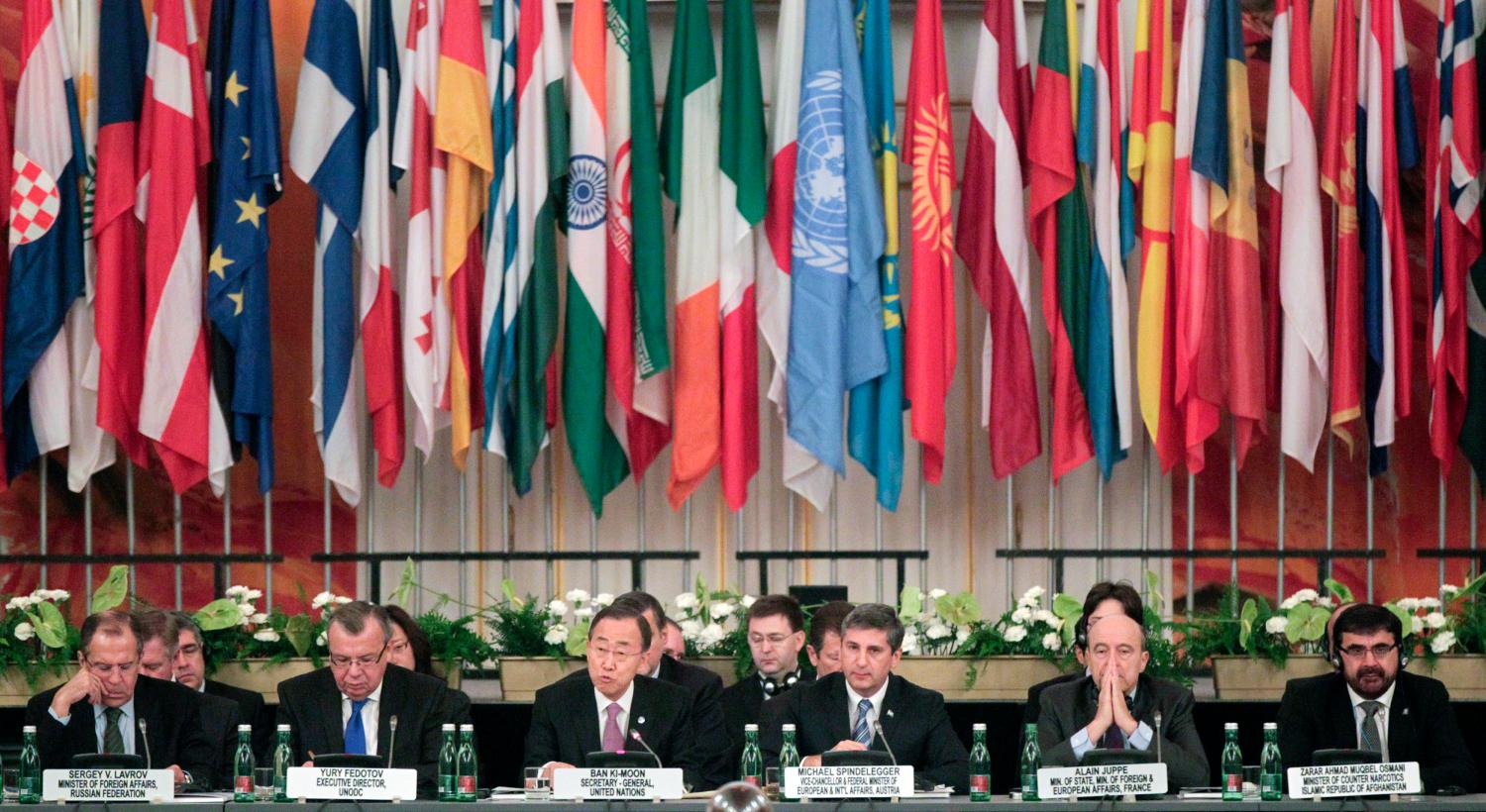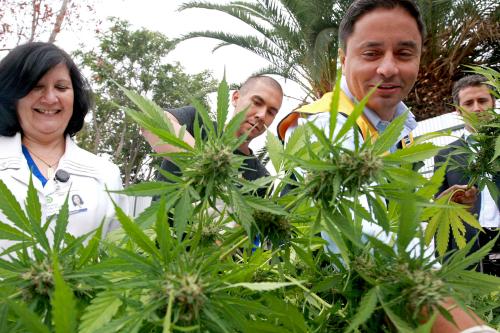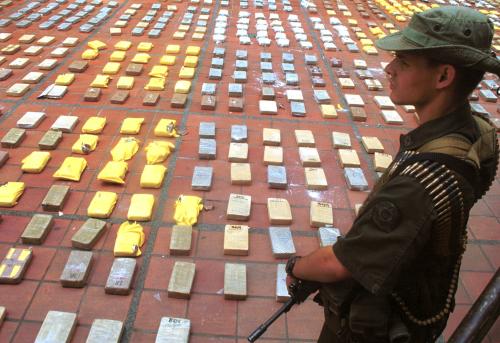As the world prepares for the 2016 Special Session of the United Nations General Assembly on the World Drug Problem (UNGASS 2016), an increasing number of countries around the world now find the regime’s emphasis on punitive approaches to illicit drugs to be problematic and are asking for reform. In this moment of global disagreement, the Brookings project on Improving Global Drug Policy provides a unique comparative evaluation of the effectiveness and costs of international counternarcotics policies and best approaches to reform.
The emerging global “dissensus” in drug policy: Geopolitics and UNGASS 2016

UNGASS 2016 in Comparative Perspective: Improving the Prospects for Success
Vanda Felbab-Brown and Harold Trinkunas show that UNGASS 2016 is likely to be contentious due to disagreements between liberalizers in Europe and Latin America and hardliners in Russia and Asia. They argue that instead of treaty revision, this global meeting should aim to open space for policy experimentation. View in: ESPAÑOL
Pushing for reform

Plan Colombia: An Analysis of Effectiveness and Costs
Daniel Mejía finds that Colombia has succeeded, at tremendous costs in blood and treasure, in significantly reducing domestic coca production and the size of the illicit economy, but he recommends alternative policies to achieve better results at lower costs.

Plus Ça Change: Structural Continuities in Mexican Counternarcotics Policy
Alejandro Hope finds that Mexico’s drug policies remain heavily militarized, and that the result has been the fragmentation of drug trafficking cartels into smaller operations that violently contest markets and extract rents from local populations.

Uruguay’s Drug Policy: Major Innovations, Major Challenges
John Walsh and Geoff Ramsey review Uruguay’s pioneering policies that legalize and regulate every level of the market for cannabis.

Legal Commercial Cannabis Sales in Colorado and Washington: What Can We Learn?
Mark Kleiman compares the results of cannabis legalization in U.S. states Colorado and Washington, and argues that problematic side effects of commercialization can be mitigated through smart state regulation of cannabis markets.

Mixed Messages from Europe on Drug Policy Reform: The Cases of Sweden and the Netherlands
Caroline Chatwin compares drug policies in Sweden and the Netherlands, which represent two extremes in the European Union between abstinence-based policies and harm-reduction approaches.
RESISTANT OR AMBIVALENT TOWARD REFORM

No Easy Exit: Drugs and Counternarcotics Policies in Afghanistan
Vanda Felbab-Brown examines the drivers of Afghanistan’s deeply-entrenched illicit economy and evaluates policy options for mitigating the threats it poses in a context of persisting instability.

Drugs and Drug Policy in Thailand
James Windle contrasts Thailand’s hardline approach toward drug trafficking and use with its successful use of alternative development efforts to curtail the cultivation of poppy.

A Slow March from Social Evil to Harm Reduction: Drugs and Drug Policy in Vietnam
James Windle reviews Vietnam’s slow shift from a repressive measures for drug trafficking and use toward greater incorporation of a public health approach to address one of Asia’s worst HIV/AIDS epidemics.

Current State of Counternarcotics Policy and Policy Reform Debates in Myanmar
Tom Kramer reviews the consequences of Myanmar’s decades of internal violence on the drug trade and the problematic consequences of drug suppression without securing alternative livelihoods.

Drugs and Drug Trafficking in Brazil: Trends and Policies
Paula Miraglia examines the relationship between drugs, illegal arms, and Brazil’s high rates of criminal violence, and highlights innovative programs such as São Paulo de Braços Abertos as positive alternatives to existing punitive drug policies.

Crime, Violence, and Politics: Drug Trafficking and Counternarcotics Policies in Mali and Guinea
Lansana Gberie examines the impacts of increased drug trafficking through Mali and Guinea on the countries’ political development and stability and considers the limitations of their weak institutions for developing effective responses.

Mixed Messages from Europe on Drug Policy Reform: The Cases of Sweden and the Netherlands
Caroline Chatwin compares drug policies in Sweden and the Netherlands, which represent two extremes in the European Union between abstinence-based policies and harm-reduction approaches.
OLD AND NEW COUNTERNARCOTICS POLICEMEN

Back in the National Spotlight: An Assessment of Recent Changes in Drug Use and Drug Policies in the United States
Beau Kilmer, Greg Midgette, and Clinton Saloga examine recent trends in U.S. drug use and analyze the federal government’s increased emphasis on treatment and flexibility toward harm reduction methods.

Narcotics and Nationalism: Russian Drug Policies and Futures
Mark Galeotti analyzes the intersection of Russia’s growing public health crisis, nationalist politics, and securitized and punitive counternarcotics policies.

A People’s War: China’s Struggle to Contain its Illicit Drug Problem
Sheldon Zhang and Ko-Lin Chin examine the roots of China’s growing drug use, the country’s strong embrace of highly punitive approaches, and the limited appetite and constituency for reform.
WHAT KIND OF COUNTERNARCOTICS REGIME REFORM?

UNGASS 2016: Prospects for Treaty Reform and UN System-Wide Coherence on Drug Policy
Martin Jelsma reviews the history of past Special Sessions of the United Nations General Assembly (UNGASS) on drugs and argues that UNGASS 2016 is unlikely to reach a consensus declaration due to global disagreements over drug policy. View in: ESPAÑOL

After the Grand Fracture: Scenarios for the Collapse of the International Drug Control Regime
Using game theory analysis, Jonathan Caulkins examines the international consequences of the decision by a single cocaine-producing or transit country to legalize drugs.





